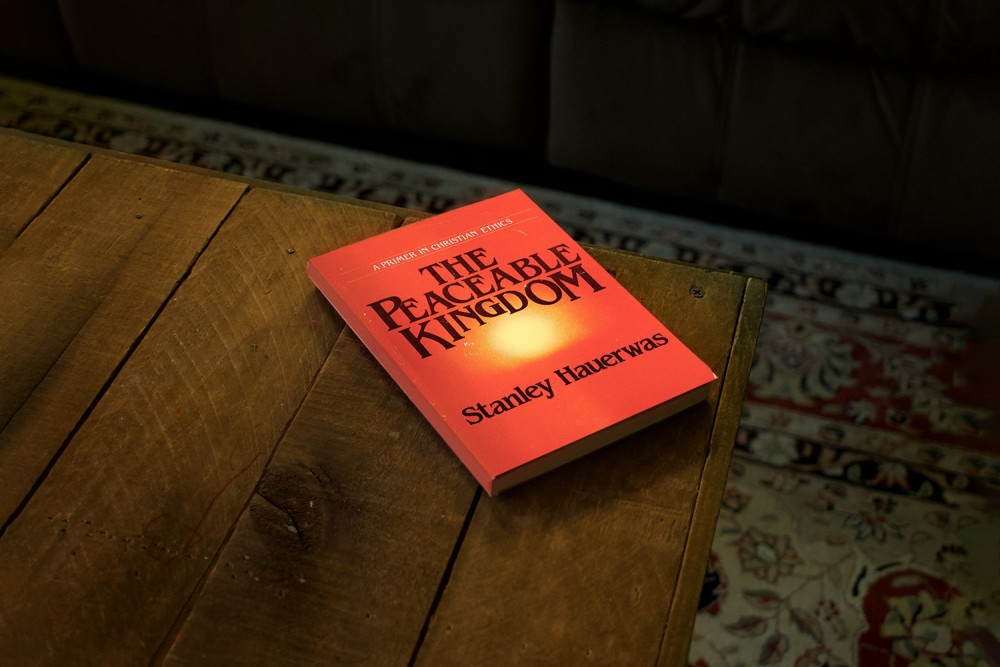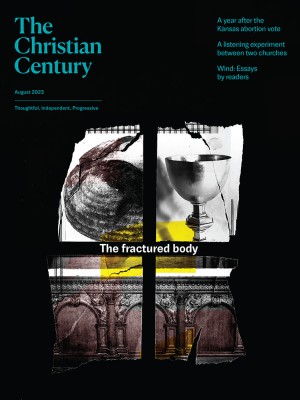
(Source image by Christian Yanes on Unsplash)
Forty years ago, Stanley Hauerwas published The Peaceable Kingdom. The instant classic also became a lightning rod for controversy, the book seeming to stand in for Hauerwas’s thorny views on justice—that it is a bad idea, that it cannot be the church’s focus, that rather than “make the world more just” the church should simply “be the church.” This sounded exactly like the kind of luxury afforded those who don’t need justice. Of course the Hauerwases of the world consider justice a bad idea—for them, it is! But for everyone suffering injustice, justice is the opposite of a bad idea. It’s the whole idea.
By the point in the book where Hauerwas pushes pacifism as an answer to injustice, many people had stopped reading. Had they kept reading they might have come to agree with him that the only thing more important than getting justice is getting justice right.
Read our latest issue or browse back issues.
Countries invade, governments imprison and execute—all in the name of justice. To deny their cause because we don’t like the consequences is to forget that a similar cause drives us progressive Christians: we too want justice. To assume tidy distinctions between just causes and their unintended consequences is to wash our hands of the untidy fact that intensely justified causes often come with intensely unintended consequences. And nothing justifies as intensely as justice. “We’re different. They say they’re after justice, but we really are.” No doubt we think that, as do they.
None of this is to deny that justice is a thing or that one can be on the wrong side of it. A history of unjust justice-mongering—no less a moral monster than Hitler prided himself a Christian “fighter for truth and justice”—cannot mean accepting a universe where all cats are gray, where lazy moral equivalences block our ability to get clear about justice. It’s not all smoke and mirrors.
But some of it is. And we can be wrong even as our grievances are right. English has a powerfully apt phrase for this: “miscarriage of justice.” Things can start right and still go wrong. Getting clear about justice matters, and it entails coming to terms with our tendency toward self-deception—a tendency that doesn’t leave you alone when you’ve been wronged. Perhaps the aggrieved can save themselves from themselves by acknowledging that it is often the aggrieved who are most vulnerable to self-righteousness. Perhaps the just remain just just insofar as they begin there.
Every political cause wants to see itself as just, and this desire tempts self-deception and self-righteousness. These temptations only get worse once you throw God into the mix. The United States initially called its response to 9/11 “Operation Infinite Justice.” If your cause is not only just but infinitely so, then your cause will be infinitely justified, as if licensed by God. The 9/11 terrorists killed 2,977 people. Perhaps only scales of infinitude can account for the 387,073 civilians the United States killed to right that injustice.
Peaceable Kingdom starts with the truism that God alone makes history come out right, the arc of the moral universe bent toward justice because bent by God. The gospel—a story in which God saves us despite us—trains Christians to see this as good news, helping them become peaceable in ways that witness to God’s peaceable kingdom. Christians pursue justice as an entailment of God’s story, not as something we need to make happen but rather as something natural to the world because natural to God, freeing us not to sit on their laurels and do nothing but to join God and risk everything. When we instead idolatrously imagine ourselves taking charge of history, self-righteousness joins forces with self-deception in desperate measures like Operation Infinite Justice—the attempt to install violently what God in Christ achieves peaceably.
God does not abandon justice to the idols of our desperation, instead achieving it by embodying it. Christ shows us what God and justice are by showing us what they look like. Jesus’ life as portrayed in Luke’s Gospel reveals what justice promises and demands as the Spirit anoints him to bring good news to the poor, freedom for captives, recovery of sight to the blind, and liberation for the oppressed—the new sheriff in town dispensing a Jubilee brand of justice (Luke 4:18–19). God’s revelation in Christ of what justice actually is relativizes our claims to justice, setting those claims, no matter how confidently staked, against the standard Jesus himself sets. If your justice doesn’t look something like Luke’s Jesus, then it has little claim on the justice of God.
The form of Jesus’ death also shows us something, though what it shows has proven difficult to keep in focus, especially amid our many flesh-and-blood calls for justice. Justice is cruciform. For Hauerwas, the peaceable form of Christ’s death reveals something about the justice Christians are called to and something about the God that calls them to it: “Nonviolence is not just one implication among others that can be drawn from our Christian beliefs; it is at the very heart of our understanding of God.” While the empire crucified Jesus, it was the justice-driven revolutionaries who betrayed Jesus into imperial hands. They could not abide his failure to usher in justice by any means necessary. Or more precisely, they could not abide the means by which the Lord did in fact usher in justice—cross and resurrection as the direct action of God.
It’s not simply that God’s justice so often differs from our justice. It’s that the difference comes in the revolutionary form it takes, including among other things the church being the church so that justice can be secured by means other than self-deceived and self-righteous violence, its peaceableness turning even revolutionaries against God. An empty tomb tells us that Christ was right exactly where we thought he was wrong, his way just because it is peaceable.






